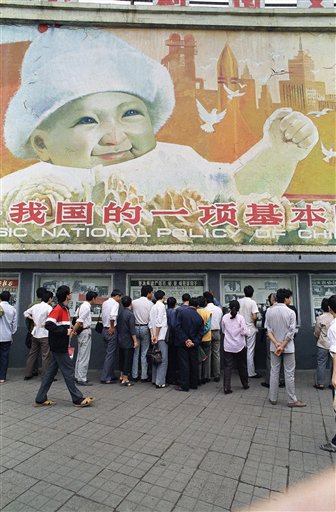On the 35th anniversary of China’s one-child policy, the view from a 30-something only child
By The World's Nina Porzucki

On the 35th anniversary of China’s one-child policy, the view from a 30-something only child
By The World's Nina PorzuckiSlowing down population growth was the plan. And the policy worked. China’s birthrate plummeted to 1.6 births per woman, a birth rate so low that it may stunt the country’s economic growth.

But now that an entire generation of only children are coming of age, the policy has loosened. Two years ago, the rules changed to allow only children to have a second child.
Sunny Yang is part of the generation of only-children. She was born in 1983 and lives in Beijing. As a kid, she says, she loved being an only child.
“When I was a kid I enjoyed it because nobody could grab my food or candy. I could enjoy everything,” says Yang.
Coming of age, and especially after entering university, her feelings about her role as the only daughter changed. That extra candy and attention as a child quickly translated to hyper-attention and pressure on her as a young adult. This put a strain on the relationship with her parents.
“I had more conflicts with my parents, especially my mother,” she says.
Yang was far from alone. About 90 percent of her classmates were only children, she says.
“The whole generation, [we’re] the same. This policy influenced a generation … and everyone just gets used to it and thinks it’s OK,” says Yang.
In fact, says Yang, many of her peers actually do not want to have more than one child. Life in the big cities like Beijing and Shanghai is expensive.

As for Yang, as her parents age, she worries about how she and her husband will be able to care for their four parents. “It is a lot of pressure for a single child like me. My husband and I must take care of our parents. Now they are still healthy, but when they grow older, it’s our duty, we must do it,” Yang explains.
Yang has one son of her own and thinking about the pressures that she feels as the only daughter has made her want to have a second child.
Her experience is vastly different than that of her parents. Her father is one of six; her mother is one of four. They told her over and over again as she was growing up that she is much better off alone. They told her stories of growing up poor and hungry.
“My father said during the great famine in the 1960s [all they had] was carrot and potato. So he said, ‘I think you’re happier than me,’” Yang adds.
She doesn’t think so. Today, she watches her parents with their siblings, laughing and joking at big family occasions.
“He has brothers and sisters at every party and gatherings. They laugh loudly and really enjoy their close relationship. I really envy them,” she says.